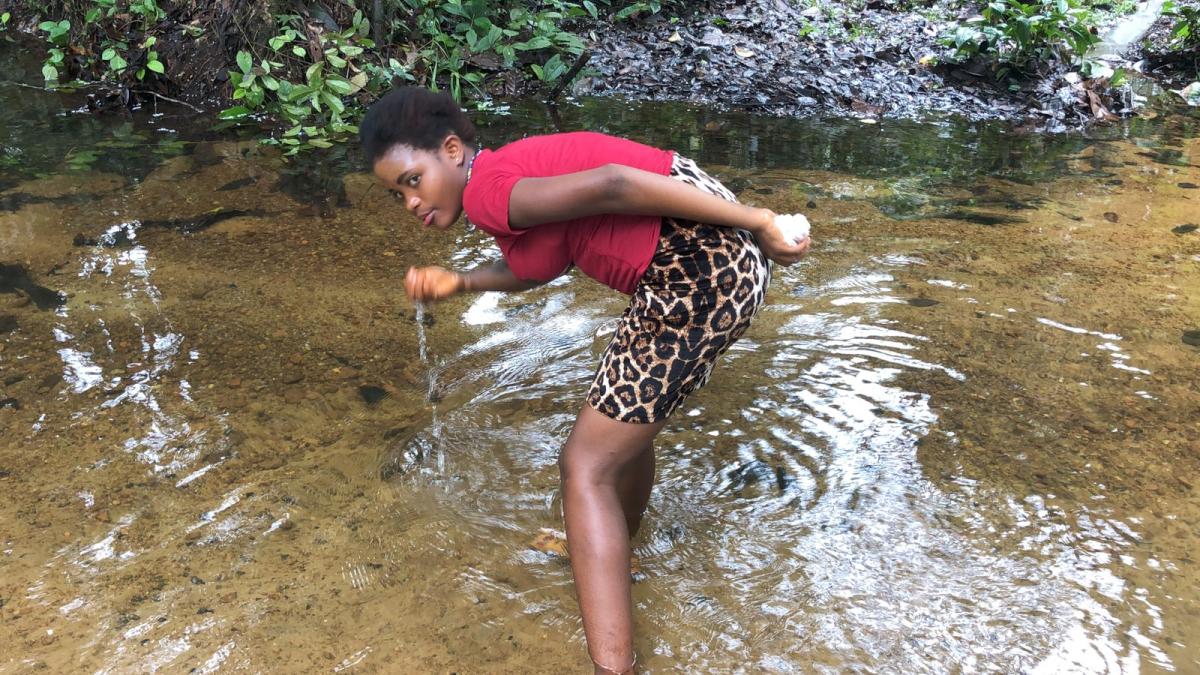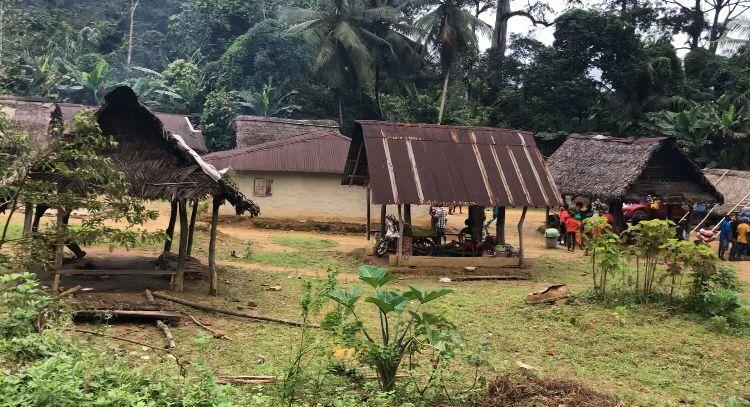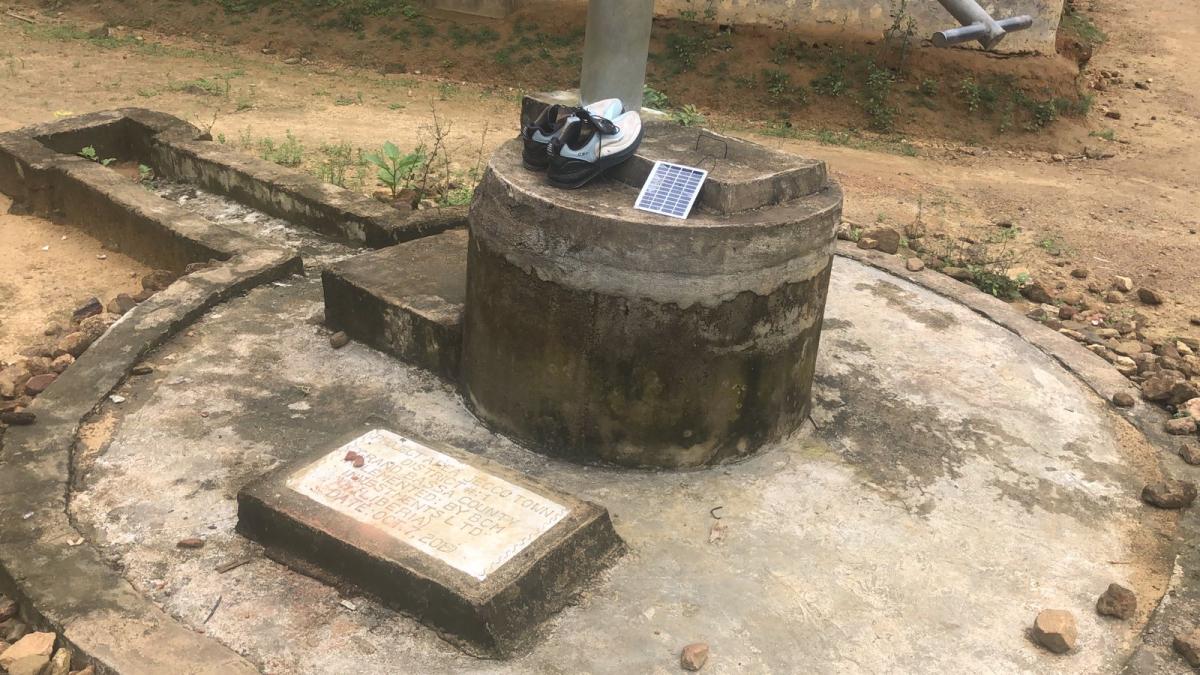Liberia: ‘My Kids Drink the Same Creek Water I Drank at Their Age’

Women of Zangar’s Town going to fetch water from their only source of drinking water near their town
--- It may seem trivial, but a study by WASH experts reveals serious threats to child and maternal health among rural dwellers in Grand Bassa County.
Residents of Jecco Town and other surrounding towns and villages near Owesgrove, Grand Bassa County District 1, are left with no alternative but to drink from creeks due to a lack of safe drinking water in their area.
The only handpump in the town has been in disrepair for five years.
“Drinking creek water has gotten used to us, because, when I was a kid, I drank this same water up to now and my little brothers and other kids are also drinking this same water from the creek,” says Baby-girl Garjay, a resident of Jecco Town.
According to Garjay, they (townspeople) have been using the nearby creeks and streams for drinking, washing, and cooking, since their only hand pump got damaged nearly 5 years ago. Hundreds of rural residents in Jecco Town and its surrounding villages in Grand Bassa County still rely heavily on creek water for cooking, drinking, washing, and bathing.
Garjay mentioned that since the establishment of the Town several years ago, they have had only a single hand pump that was constructed by a group named ‘BCM Incorporated’ in October 2019. Since the handpump got damaged, however, they are yet to benefit from such an essential need as a people.
The lack of safe drinking water facilities remains a major challenge for Liberians mainly in the rural parts of the country. Several miles away, in Duhwien Town, located in District #3, the same problem persists. Home to more than 625 people, the town has been in existence since 1930.
According to case studies done by the WASH Media Network of Liberia in Duhwein and several other towns across Grand Bassa County and published two years ago, the town did not have access to safe drinking water. The studies conducted were intended to build a solid evidence base for future interventions adapted to an in-depth understanding of the context and community priorities.
The case studies were part of an effort to raise awareness of the findings from the formative research conducted by the Liberia WASH Consortium (LWC) through Concern Worldwide, Action Against Hunger, and WaterAid Liberia in five counties in Liberia.
The research centered around access to food security and nutrition, although access to safe drinking water featured in major part, especially where causes of recurring diseases are concerned.
“Grand Bassa County is among the five counties that had the highest burden of stunting (children too short for their age) in the country. The county also has challenges in food security, water, hygiene, and sanitation, as well as gender, undermining child and maternal nutrition across the two livelihood zones of the county. Rates of stunting remain chronically high, exceeding 30% in the county per the 2018 Comprehensive Food Security and Nutrition Survey (CFSNS),” the research said.
It is not clear whether any interventions have been made in Duhwein Town since then. At the time, there were six hand-dug wells in the town and all were nonfunctional. So the people had no option but to drink from an unsafe water source they considered an ‘oracle.’
According to the case studies, the people of Duhwein Town call the water source an oracle because it does not run dry. The water shoots out from a particular point, and one has to wade through another waterway to get there. Even during the peak of the dry season, the oracle water never runs dry, constantly putting out water. Yet, this oracle water source, which everyone in the town drinks from, is about a 25-minute walk from the town into the forest.
If Duhwein Town’s residents want to access the market, water, sanitation, and health (WASH) facilities, they have to make their way to the county’s capital, Buchanan City, which is about a 22-minute drive away.
Alex Thomas, a resident of the nearby William Potter Town, said that their rights have been denied by their leaders and that they have been deprived of safe drinking water.
“Sometimes I sit and cry when I see my children drinking the same water I drank when I was young. We’ve been crying on our leaders to help us but they’re yet to listen to us,” he said.
He further said, “It’s my prayer that humanitarian organizations will see this story to come to our aid because the lack of safe drinking water is a major challenge for us.”
Toe stressed that pregnant women, babies, and children are the ones mostly infected by the creek water. He said that many times babies and pregnant women suffer from diarrhea due to the contamination of the water.
“The other time, my wife nearly died because she was pregnant and, by that time, the company was cleaning the road and so the whole water got dirty but we had no option but to drink the dirty water.”
According to him, their lives will always be at health risk if nothing is done to help them get safe drinking water. In Zangar’s Town, about a 2-hour drive away from Buchanan City, again there is no safe water, improved sanitation, market, or health facilities. The town’s 279 inhabitants have to trek two hours to another town to access health and market facilities.
According to the Wash Media Network’s case studies, the rainwater from everywhere, including where they go to defecate, enters the same creek they drink from.
“When asked about what they think about the water source, they said they are aware of the unsafe water source, which usually causes waterborne diseases and high rate of diarrhea, but noted that God has been protecting them and preserving their lives.”
“We know the risk involved, but we don’t have an option because this is the only source of drinking water for us,” residents disclosed to WASH Media in a group conversation.
Back in Jecco Town, Representative Hans Barchue, the lawmaker for District #1, said, “we once managed to ensure that they had a hand pump but I didn't know it spoiled months back. They had no road here and I just completed the road and so I'll look into their request very soon.”



